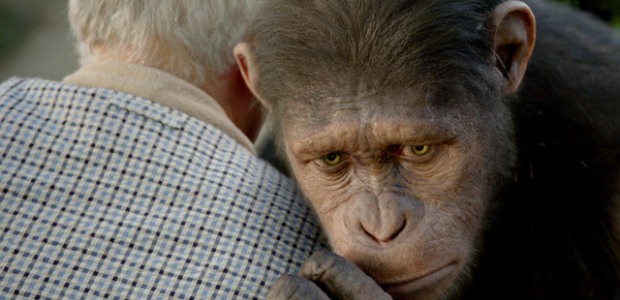How do you explain half the audience glued to their seats even as the end credits roll up? At the end of the film, one word I heard myself say was “Awesome!”. As this year’s summer movie mania draws to an end, Rise of the Planet of the Apes is the ground-breaking vehicle that will stay with us for a long time.
The most powerful aspect of this film is its totally engaging story. Let’s forget for a moment what we have seen and learnt in previous films of the same name. Scripted by Rick Jaffa and Amanda Silver, and loosely based on Pierre Boulle’s novel, the concept here is mind blowing to say the least. As a scientist at a pharmaceutical company, Will Rodman (James Franco) believes he has developed a cure for Alzheimer’s disease. Having successfully tested a genetically engineered retrovirus in chimpanzees, Rodman is all set to go public when a test subject goes berserk and is consequently put down. Discovering the offspring of his ill-fated test subject, Rodman takes the baby chimp home where his father Charles (John Lithgow) names him Caesar. As it turns out, Caesar is no ordinary chimp, having inherited human-like intelligence from his mother. Then comes a powerful turning point in the story – Caesar must decide if he wants to remain a lab subject or free himself from captivity.
When Planet of the Apes was re-made in 2001, director Tim Burton’s saving grace was the head-reeling twist in the end. What we here is far more powerful. As the new director, Rupert Wyatt brings together a full bodied story in such a manner, he has obliterated all preceding films, including the 1968 original. Having said that, this is one of those rare films where the story outdoes almost every other aspect of the production. Good thing then because I really doubt James Franco is receiving an Oscar for this film and you can be absolutely sure, neither is Freida Pinto. On that note, I really don’t see what Pinto has contributed to this film except a pretty smile. Yes, there are a few British-American accented words here and there as compared to her non-existent dialogue in Slumdog Millionaire, but that’s about it. On the other hand, Lithgow is heart wrenching as an Alzheimer’s patient and you feel for his character. Tom Felton brings aboard his nasty persona from the Harry Potter franchise and his character gets what he deserves, in what I thought is an inside joke featuring a not-so-magic wand. But as I mentioned earlier, the story is just too captivating for anyone to be even slightly bothered by screen time fillers like Pinto or Felton.
Aside from the phenomenal plot, the other accolade is the ground-breaking technology used to animate apes. When Avatar came out, director James Cameron was credited with the use of ground-breaking technology known as “motion capture”. Wyatt raises the bar with acute advancements now known as “performance capture”. Known for his role as Gholam in Lord of the Rings and Kong in King Kong (2005), Andy Serkis as Caesar is an epitome of a living, breathing, swinging ape and is easily the best moments in the film. It felt as though an ape was trained to act.
As if the story is not engaging enough, Wyatt’s triumph is the questions he leaves us mulling over. While our greatest strength is our intelligence, are we most vulnerable in our tendency to become complacent? This puts the human race at a disadvantage as we as a species have stopped evolving since we learned to walk upright. Whereas, every other species continue to evolve just to survive. Imagine for a minute, what if the highly agile and comparatively stronger-bodied ape were to slightly improve in intelligence. Would humans still dominate all other species? Or, will we eventually cause our own extinction and in the process allow another species to reign supreme? You know as well as I do what the answers to those questions are. And if you hesitate, don’t say I didn’t warn you if Caesar forces it out of you!
Rating: 




